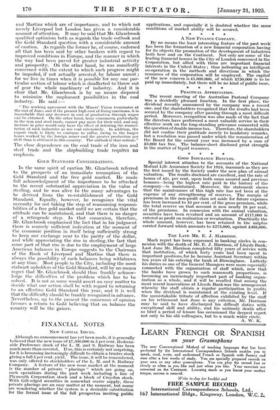Although no announcement has yet been made, it is generally
believed that the new issue of 27,500,000 in 5 per cent. Redeem- able Preference stock of the L. M. and S. Railway has been much more than covered. If so, this is certainly not surprising, for it is. ecoming increasingly difficult to obtain a trustee stock giving a full 5 per cent. yield. The issue, it will be remembered, was only offered to stockholders of the L. M. and S. Railway Company. A feature of the new issue market at the moment is the number of private " placings " which are going on, such operations during the past week including a line of Plymouth Corporation stock and a block of Croydon stock. With Gilt-edged securities in somewhat scarce supply, these private placings are an easy matter at the moment, but many are wondering whether the system is a desirable substitution for the formal issue of the full prospectus- inviting- public
applications, and especially it is doubted whether the same conditions of market ability will be secured.
A NEW FINANCE COMPANY.
By no means the least interesting feature of the past week has been the formation of a new financial corporation having for its objects the promotion of the development of industries both here and on the Continent. Not only are some of the leading financial houses in the City of London concerned in the Corporation, but allied with them are important financial interests in the United States ; thus indicating an intelligent co-operation in the" methods and directions in which the resources of the corporation will be employed. The capital of the new concern is £1,000,000, of which £750,000 is to be paid up immediately, but there will be no kind of public issue.
* *
PRACTICAL APPRECIATION.
The recent meeting of the Australian Pastoral Company was a decidedly pleasant function. In the first place, the dividend recently announced by the company was a record one, and the shareholders recognized that the results had been secured by the company after passing through a most difficult period. Moreover, recognition was also made of the fact that the directors have performed a most valuable service in their effective work on the long-standing grievance connected with the question of double income tax. Therefore, the shareholders did not confine their gratitude merely to laudatory remarks, but a resolution was passed under which the remuneration of the Board for the current year was increased by a sum of £3,000 tax free. The balance-sheet disclosed great strength in the matter of liquid resources.
* * * *
GOOD INSURANCE RESULTS.
Special interest attaches to the accounts of the National
Mutual Life Assurance Society. for 1924, inasmuch as they are the first issued by the Society under the new plan of annual valuation. The results disclosed are excellent, and the rate of bonus of 42s. per cent. upon both sums assured and previous bonuses—being the highest rate paid in the history of the company—is maintained. Moreover, the statement shows that the maintenance of this high rate has not been at the expense of any strengthening of. reserves. The margin of premiums in the non-profit class set aside for future expenses has been increased to 10 per cent. of the gross premium, while the total reserve on that account is now nearly 18 per cent. of the premiums. In connexion with the annual valuation, securities have been revalued and an amount of £117,000 is entered as profit on realization or revaluation. Practically the whole amount, however, has been retained in the surplus carried forward which amounts to £575,000, against £468,000.
* * * *
Tim LATE Mn. E. J. HARRISON.
Much regret has been expressed in banking circles in con-
nexion with the death of Mr. E. J. Harrison, of Lloyds Bank.- Last June Mr. Harrison completed fifty years of service with that institution, of which forty years had been spent in important positions, for he became Assistant Secretary within ten years of his entering the bank at Birmingham. Latterly, his duties as one of the General Managers were more especially connected with- the organization of staff which, now that the banks have grown to such mammoth proportions, is becoming an increasingly important part of banking organ- ization as a whole, and it will be recalled that among the most recent innovations at Lloyds Bank was the arrangement whereby the staff obtain a regular participation in profits when the dividend is maintained at the existing level. If the unmistakable tribute of affection exhibited by the staff on his retirement last June is any criterion, Mr. Harrison may be said to have discharged his difficult duties with exceptional skill and ability, and his untimely death after so brief a period of leisure has occasioned the deepest regret not only to his old colleagues, but to a much wider circle.
A. W. K.














































 Previous page
Previous page